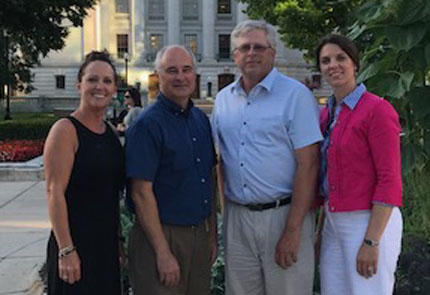Soil Science Society of America
5585 Guilford Road • Madison, WI 53711-5801 • 608-273-8080 • Fax 608-273-2021
www.soils.org
Twitter | Facebook
NEWS RELEASE
Contact: Hanna Jeske, Associate Director of Marketing and Brand Strategy, 608-268-3972, hjeske@sciencesocieties.org
Advancing a shared goal for farmers and conservation
The Nature Conservancy and the American Society of Agronomy (ASA), Crop Science Society of America (CSSA), Soil Science Society of America (SSSA)—collectively known as the TriSocieties—today announced a new partnership to advance the science of soil health.
 The two organizations signed a memorandum of understanding (MOU) based on the mutually held belief that farmers can remain profitable while protecting the environment. The steps outlined in the agreement are designed to empower America’s growers with pragmatic, science-based practices.
The two organizations signed a memorandum of understanding (MOU) based on the mutually held belief that farmers can remain profitable while protecting the environment. The steps outlined in the agreement are designed to empower America’s growers with pragmatic, science-based practices.
“With a common commitment to science and the improved sustainability of America’s agricultural lands, we are pleased to partner with the TriSocieties,” said Larry Clemens, director of The Nature Conservancy’s North America Agriculture Program. “Together, we will advance the science of soil health and nutrient management, while helping America’s farmers meet growing crop demands and safeguard natural resources.”
“The TriSocieties’ members provide ongoing research and education in soil health and nutrient management. The Conservancy has a focus on these same issues. This partnership advances our mutual commitment to sustainable agricultural lands,” said Ellen Bergfeld, CEO of the TriSocieties.
The agreement lays out a framework for leveraging the organizations’ respective strengths in pursuit of the following mutual goals:
- Increasing overall understanding of nutrient and soil health practices through collaborative educational programs;
- Advancing the science of soil health;
- Advancing and documenting the value of Certified Crop Adviser (CCA) members’ role in soil health, nutrient management, and water quality;
- Building a broad coalition to support soil health across North America, including a commitment to advance policies, build consensus for standardized measurements, and improve land management practices.
The MOU is a natural next step in what has and continues to be a productive collaboration between the TriSocieties and the Conservancy to ensure sustainable agriculture lands. Last year, the Conservancy supported the TriSocieties’ development of an advanced certification in nutrient management for Certified Crop Advisers (CCAs). The TriSocieties provide certification and continuing education to over 13,000 CCAs in North America. Of those, nearly 300 passed the rigorous exam for this specialized certification.
“CCAs, particularly those certified in the 4R principles – applying the right nutrients at the right rate, right time, and in the right place – are among the soil’s best allies in helping growers improve soil health and water quality,” said Bergfeld.
Healthy soil provides unrivaled benefits – including clean water – that sustain all forms of life, yet these soils are increasingly rare.
“According to Nature Conservancy calculations, improving soil on more than half of U.S. soy, wheat and corn croplands could deliver up to $7.4 billion in environmental and societal benefits annually,” said Clemens. “Furthermore, farmers stand to gain $37 million for each one percent of cropland transformed—that’s $1.2 billion annually across the U.S. corn belt. Together, the TriSocieties and the Conservancy can make a lasting impact on our farms and our environment.”